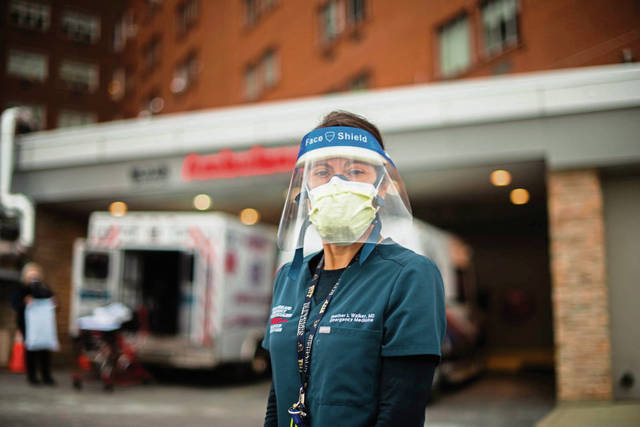https://triblive.com/local/westmoreland/as-virus-cases-deaths-mount-westmoreland-hospital-officials-plead-for-the-publics-help/
As virus cases, deaths mount, Westmoreland hospital officials plead for public’s help

The start of the coronavirus pandemic in March was nothing like the current surge.
There was uncertainty back then as the virus quietly crept into the community, said Dr. Heather Walker, assistant director of the emergency department at Excela Health Westmoreland Hospital in Greensburg.
But now, the alarms are sounding loud and clear.
“We’re seeing more significantly ill covid patients than we did before,” she said. “There are significantly more patients requiring hospitalization than in the spring.”
Community members who are not taking adequate precautions to limit the virus’s spread in their day-to-day lives are putting a strain on the health care system, Walker said. That means staff members are holding the hands of patients dying alone, delivering bad news to those patients’ families, contracting the virus themselves and experiencing a high, ongoing level of stress every day at work.
“It makes me angry, to be honest,” said Dr. Carol Fox, Excela Health chief medical officer. “It’s frustrating; it breaks my heart.”
Excela Health has seen a steady increase in hospitalizations of coronavirus patients, prompting officials to concoct plans to add more space in at least one hospital. Of all patients at Excela’s three hospitals early last week, 40% were admitted because of the coronavirus, Fox said. That is the most since the pandemic began. She described it as “relentless.”
State officials and health systems across Pennsylvania have issued warnings in recent days that hospitals are becoming overrun as staff shortages could mean fewer beds available to treat patients.
On Saturday, there were 131 patients hospitalized in the county with covid-19 — a 22% increase from Dec. 1 and 185% more since Nov. 1, according to state data. On Thursday, there were 139 patients hospitalized with covid-19 — the most since the pandemic hit the county March 18.
Employees from other departments are being tapped to help with patients at Excela Health’s three hospitals as staffing hits a “very critical level,” Fox said.
“I have staff here that are working so hard, it is just heartbreaking the things they have to do,” she said. “They’re holding up the phone so that a pastor can sing a hymn to somebody as they die.”
Countywide, 289 residents have died after contracting the virus — with about 100 in November alone, according to state statistics. Over the first 12 days of December, 85 deaths were reported, the data shows.
Walker and others in the emergency department are in charge of determining the best course of treatment for patients, which often means admitting the most sick into the hospital. They are wearing eye protection and masks for eight- to 12-hour shifts with scarce time alone to have a break from their mask. They take extra time to put on protective gear when entering the room of a patient who has covid.
“But, yet, we see many people not taking adequate protections in their day-to-day life to limit the spread,” Walker said. “It’s extremely frustrating. I would encourage people to wear a mask. I strongly believe that masks work.”
Fox shared in those frustrations.
“It’s a 24/7 thing that’s on your mind and you’re answering questions and you’re trying to make decisions and you’re trying to figure out what’s the next best move to make and keep as many people safe and healthy as possible,” she said.
Rural and suburban hospitals that don’t have the same level of resources as larger health systems can feel the effects of community members disregarding health officials’ recommendations sooner than their bigger counterparts, said Dr. Amesh Adalja, a Pittsburgh-based infectious disease and critical care physician.
“Eventually, if you’re still seeing the level of spread … hospitals like that are going to end up being like canaries in the coal mine,” he said.
Health care officials should speak candidly to the public, family and friends in an effort to drive home the seriousness of what is happening inside hospitals, he said.
Walker barely gets a day off. Even if she’s spending time with her son, the thoughts of what is waiting at work are never far.
“I wish people in the community would take this situation more seriously,” she said. “People took it very, very seriously in the spring. … Now, there is a crisis and people won’t take it seriously.”
Copyright ©2026— Trib Total Media, LLC (TribLIVE.com)
